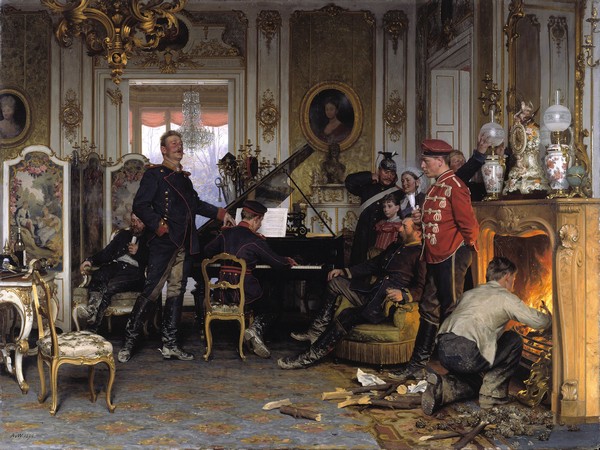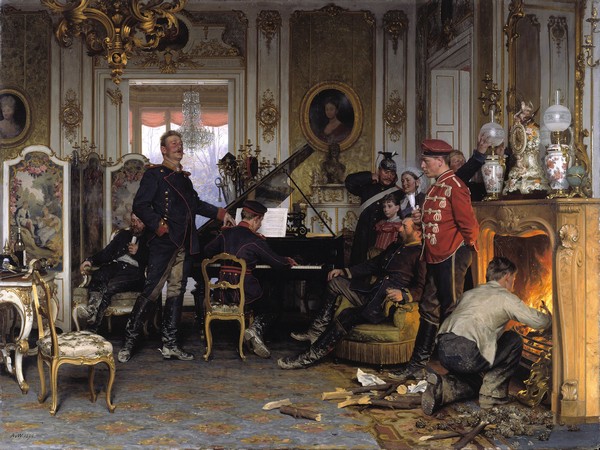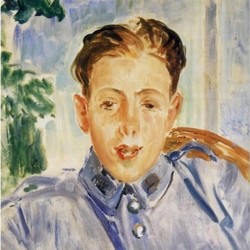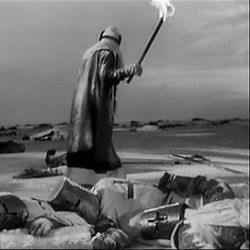
If you have visited the Alte Nationalgalerie in Berlin, you may have stopped before the painting illustrating this article, Im Etappenquartier vor Paris [In the Troops' Quarters outside Paris], an oil on canvas painted by Anton von Werner in 1894. Eight soldiers of different ranks gather in a relatively small space, from the orderly who lights the fire to those who sit casually in the armchairs, probably those of higher rank. Although we don't know the context of the scene, the pickelhaube on the table at the left and the czapka that wears the officer who amiably speaks with the concierge identify the soldiers as Germans; the house, according to the title of the painting and the decoration, is French. The scene is surprising, and even more so if we look at it in detail (in this link you can see the enlarged painting), but, as music and Lied lovers, our look is attracted by the two central characters: the man sitting on the piano, and the man singing. We even know the work they perform: Am Meer [By the sea] by Franz Schubert, with poem by Heinrich Heine, Schwanengesang's lied No. 12.
And how do we know they sing this Lied? Because the painter himself shared many details about his work. Anton von Werner, born in 1843, was declared unfit for military service and did not participate in the Franco-Prussian War in 1870; however he was sent to Paris to document the victory of the Prussian army in the war. Napoleon III had surrendered at the Battle of Sedan on 2 September, and by 17 September the siege of Paris was beginning. On 15 October, the German army had occupied Brunoy, some 20 km southeast of the capital, and the General Staff requisitioned the small châuteau des Ombrages, built a couple of years earlier, to settle and to set up a hospital. Werner travelled with the officers and made different sketches while he was there. These sketches were used to paint Im Etappenquartier vor Paris twenty-four years later.
I said before the scene was surprising, on the one hand because the furniture is intact, only the carpet is damaged because the boots are dirty with mud. The soldiers could have found a suitable place to hang sabres and caps instead of the wall light, and we notice they were served from the wine cellar. However, the ordinance that lights the fireplace has picked up branches and pineapples, and he is not burning the furniture. In other words, given the circumstances, everything is virtually undamaged. Werner's sketch didn't show the furniture, but in his explanations he claimed that everything was intact.
More surprisingly, the housekeeper does not seem to feel threatened by the forced guests, and smiles when talking to one of them; she's so confident that she even has her daughter with her. According to the painter, the two would have entered the room after hearing the music; the girl's serious expression could reflect that she feels intimidated or abstracted by music. Considering that at that time most of the officers were from wealthy families, it is not unusual that two of them were able to perform a well-known Lied by Schubert. Werner also tells us that the military at the time loved the song Am Meer, probably because of its melancholy, its strength, and because the poem could be understood as a farewell from the beloved.
And what about the score? There is one on the piano, but the details are not distinguished. The pianist could play the song by heart, or maybe he had some pieces of music in his luggage; it's also probably that they found the sheet in the house, Schubert's lieder were much loved in Paris. The thing is that, for a while, both the Prussians and the French forgot about the war and took refuge in the beauty of Schubert's music. Or at least that is what Anton von Werner explains.
The city of Paris surrendered on 28 January 1871. A few days earlier, on 18 January, Wilhelm I of Prussia had been proclaimed as Emperor of Germany in Versailles (a ceremony that Werner also immortalized in a picture destroyed in World War II, although a copy is preserved). In May, the Treaty of Frankfurt was signed, which meant for Europe a new state, new borders, and the seeds of the First World War. German troops did not withdraw from Brunoy until autumn, leaving fifty-two companions buried there.
Our song this week, of course, is Am Meer, which we will hear performed by Hans Hotter and Gerald Moore
Das Meer erglänzte weit hinaus
Im letzten Abendscheine;
Wir sassen am einsamen Fischerhaus,
Wir sassen stumm und alleine.
Der Nebel stieg, das Wasser schwoll,
Die Möwe flog hin und wieder;
Aus deinen Augen liebevoll
Fielen die Tränen nieder.
Ich sah sie fallen auf deine Hand,
Und bin aufs Knie gesunken;
Ich hab’ von deiner weissen Hand
Die Tränen fortgetrunken.
Seit jener Stunde verzehrt sich mein Leib,
Die Seele stirbt vor Sehnen; –
Mich hat das unglücksel’ge Weib
Vergiftet mit ihren Tränen.
Please follow this link if you need an English translation


















Comments powered by CComment